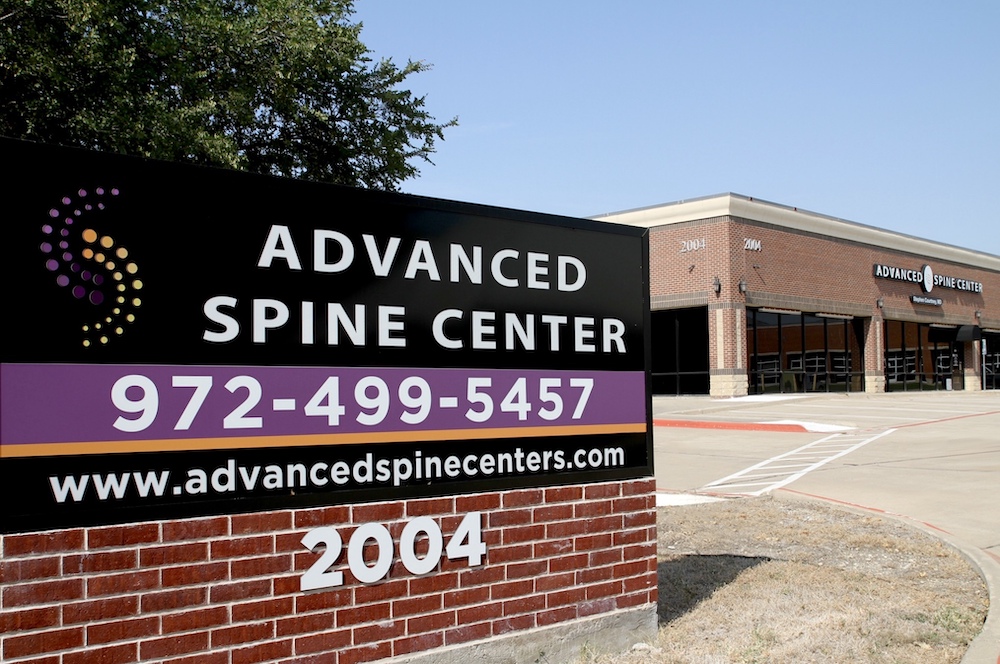Cervical Revision Surgery Frisco, TX
Home > Orthopedic Spine Surgeon in Frisco, TX > Cervical Revision Surgery Frisco, TX
Specialties
Cervical Revision Specialist in Frisco, TX
A very small percentage of cervical spine surgeries fail to treat patients’ neck pain as intended. When a cervical spine fusion, anterior cervical discectomy, or other surgery fails, it may necessitate a second surgery to correct the issues from the first surgery. This second surgery is known as cervical revision surgery.
Patients with failed anterior cervical fusions and other cervical surgeries in Frisco should contact the Advanced Spine Center. Dr. Courtney is a board-certified and fellowship-trained orthopedic spine surgeon with extensive experience in both initial and revision surgeries. If you have unresolved pain, a failed spinal fusion, or another issue from a previous surgery, consider revision cervical spine surgery. To schedule an appointment, please call our office at 972-499-5457 today.
What Is Cervical Revision Surgery?

Cervical revision surgery is a complex medical procedure performed to correct complications or failures resulting from previous cervical spine surgeries. The cervical spine consists of seven vertebrae in the neck, and it plays a crucial role in supporting the head and allowing for its range of motion. When a patient experiences problems or inadequate outcomes following initial cervical spine surgery, cervical revision surgery may become necessary to address these issues.
When Do We Recommend a Cervical Revision?
Cervical revision surgery is recommended when a patient experiences complications, pain, or limited mobility after a previous cervical spine surgery. These complications can arise for various reasons, such as failed fusion, hardware-related issues, or the development of adjacent segment disease. Another possible issue is recurrent cervical soft disc herniation. In such cases, revision spine surgery becomes a viable option to improve the patient’s quality of life and alleviate discomfort.
Failed Neck Surgery Syndrome
Failed Neck Surgery Syndrome (FNSS), also known as failed cervical spine surgery, is a condition that occurs when a patient’s initial cervical spine surgery does not yield the desired results. FNSS can lead to persistent pain, limited mobility, neurological deficits, and a decrease in overall quality of life. Cervical revision surgery is often recommended to address these issues and provide relief.
What Are the Symptoms of a Failed Cervical Spinal Fusion?
Recognizing the symptoms of a failed cervical spinal fusion is crucial for timely intervention. Common symptoms of a failed cervical spinal surgery include the following.
- Persistent neck or arm pain: Patients may continue to experience neck or arm pain even after the initial surgery.
- Limited mobility: Limited range of motion in the neck and difficulty in performing daily activities.
- Numbness or tingling: Sensory disturbances, such as numbness or tingling, in the arms or hands.
- Muscle weakness: Weakness in the neck, arms, or hands.
- Difficulty swallowing: Dysphagia, or difficulty in swallowing, may occur due to compression of the esophagus.
If any of these symptoms persist or worsen following cervical spine surgery, consulting with a spine specialist is essential to determine whether cervical revision surgery is necessary.
How to Correct a Failed Cervical Fusion With Revision
In many cases, the solution for a failed cervical spine surgery is a revision cervical discectomy and fusion. A discectomy is the removal of damaged or herniated discs. A fusion involves permanently joining two or more vertebrae. These procedures have specific goals: decompression and stabilization, respectively. Below, we outline the purposes of each procedure in a revision spine surgery.
Decompression
In cervical decompression surgery, the purpose is to relieve pressure on compressed spinal nerves. Typically, the surgeon will remove disc material, bone, or other materials surrounding the compressed nerve root. They widen the space through which the nerve root passes, alleviating the pressure and, therefore, the pain. Most commonly, the specific decompression surgeries used include discectomies, laminectomies, and foraminotomies.
Stabilization
In cervical stabilization surgery, the goal is to limit excessive neck movement that causes pain. Cervical fusion is an option for stabilizing the cervical spine. Generally, fusion can involve bone grafts, internal fixation, screws, and other hardware. This keeps the cervical spine alignment in place, as well as reduces the mobility of the neck to reduce pain.
As we mentioned before, many surgeons prefer a dual approach of decompression and fusion for revision spine surgery. This reduces the likelihood of complications, as well as the need for yet another revision spine surgery.
How Can I Prepare for Cervical Revision?

Preparing for cervical revision surgery is essential for a successful outcome. You can prepare for revision spinal surgery in the following ways.
- Consultation: Consult with a spine specialist who will assess your condition, review your medical history, and discuss the surgical procedure and potential risks.
- Medical evaluation: Undergo a comprehensive medical evaluation, including blood tests and imaging studies, to ensure you are in good overall health for surgery.
- Medication review: Inform your surgeon about any medications you are currently taking, as they may need to be adjusted before surgery.
- Smoking cessation: If you smoke, quitting before surgery can improve healing and reduce complications.
- Physical preparation: Engage in exercises and physical therapy as recommended by your surgeon to optimize your physical condition before surgery.
- Prepare your home: Make necessary arrangements for your home, such as installing assistive devices and ensuring a comfortable and safe environment for your recovery.
What Is the Cervical Revision Process?
The cervical revision process can vary depending on the specific issues that need to be addressed. Dr. Courtney will advise you of the steps of the procedure before it happens so you’ll know what to expect. Most cervical revisions typically follow these general steps:
- Anesthesia: You will have anesthesia to ensure you are comfortable and pain-free during the surgery.
- Incision: The surgeon makes an incision in the neck to access the cervical spine.
- Hardware removal or replacement: If necessary, any hardware from the previous surgery may be removed or replaced.
- Decompression: The surgeon may perform decompression procedures to relieve pressure on nerve structures.
- Bone graft: To encourage fusion, bone graft material may be placed between the vertebrae.
- Stabilization: The surgeon will stabilize the spine, often using screws, plates, or cages.
- Closure: Once the necessary steps are completed, the incision will be closed, and you will be moved to a recovery area.
What to Expect After Cervical Revision Surgery
After cervical revision surgery, the recovery process is a critical phase of your treatment. The more closely you adhere to your doctor’s postoperative instructions, the better. Generally, you can expect the following after your revision spine surgery is finished.
- Hospital stay: Depending on the complexity of the surgery, you may need to stay in the hospital for a few days for close monitoring.
- Pain management: You will receive pain medications to manage post-operative pain.
- Neck brace or collar: In some cases, your doctor may ask you to wear a collar or neck brace to support your neck during the healing process and maintain stability.
- Physical therapy: Physical therapy and rehabilitation will begin shortly after surgery to help you regain strength, mobility, and function.
- Follow-up appointments: Attend all regular follow-up appointments with your surgeon to monitor your progress and address any concerns.
What Is the Recovery Time for Cervical Revision?
Recovery time after cervical revision surgery can vary depending on the complexity of the procedure and individual factors. The first few weeks after your procedure are critical, as you will need as much rest as possible for an easy recovery. You should also avoid activities that strain your neck in any way.
Your physical therapy may begin in the first few weeks following your surgery. Physical therapy may continue for several weeks or months to optimize your recovery and regain strength. Again, it is extremely important to adhere to the physical therapist’s instructions for your recovery.
Many patients have a full recovery around six weeks after surgery. However, it could take as long as a year to return to your normal activities. This depends on the condition treated, the extent of the surgery, and what specific activities you are returning to.
What Is the Success Rate of Cervical Spine Revision Surgery?
The success rate of cervical spine revision surgery can vary depending on several factors, including the underlying issues, the patient’s overall health, and the surgeon’s skill and experience. However, most patients experience significant improvement in pain relief, mobility, and overall quality of life following a successful cervical revision surgery.
Am I a Good Candidate for Cervical Revision Surgery?

Determining whether you are a suitable candidate for cervical revision surgery is a decision that should be made in consultation with a spine specialist. Generally, you may be a good candidate for cervical revision surgery if you have:
- Experienced complications or inadequate results from a previous cervical spine surgery.
- Persistent neck or arm pain, limited mobility, or neurological deficits.
- Reasonably good overall health and can tolerate surgery and the recovery process.
Your surgeon will assess your specific condition and recommend the most suitable treatment plan, which can include cervical revision surgery or alternative therapies.
Potential Risks and Complications of Revision Cervical Spine Surgery
As with any surgical procedure, there are potential risks and complications associated with revision cervical spine surgery. Complications after cervical revision spine surgery are rare, but it is important for patients to understand the risks of a procedure before undergoing it. Some potential complications of cervical revision include the following.
- Infection
- Bleeding problems
- Injury to spinal nerves or spinal cord
- Failed anterior cervical fusion
- Adjacent segment disease
- Spinal deformity
- Hardware problems
- Anesthesia complications
It’s essential to discuss these potential risks and complications with your surgeon before undergoing cervical revision surgery. Dr. Courtney always takes steps to minimize these risks and ensure the best possible outcome for every patient.
Contact a Cervical Revision Specialist at the Advanced Spine Center Today
Neck pain is difficult to live with, especially if it is accompanied by other symptoms like numbness and tingling. If you have undergone cervical spine surgery only to be left in need of revision, the team at the Advanced Spine Center is here for you. Our top Frisco orthopedic spine surgeon, Dr. Courtney, has decades of experience helping struggling patients find relief from their pain.
To schedule a consultation about your symptoms and pain, please call our office at 972-499-5457 or fill out our online intake form.

Request an Appointment
Common Patient Questions
ExcellentBased on 147 reviews
 Robert AliceaThe doctor and his staff were very welcoming and kind ..explained my issues in detail . Will highly recommend
Robert AliceaThe doctor and his staff were very welcoming and kind ..explained my issues in detail . Will highly recommend German CisnerosEvery visit to Dr. Courtney's office is educational and most beneficial. Dr. Courtney and ALL of his staff are the best!
German CisnerosEvery visit to Dr. Courtney's office is educational and most beneficial. Dr. Courtney and ALL of his staff are the best! Jamey DerryberryMy wife and I both go to Dr Courtney for back issues. Great care. Great staff. Great surgical facility and smooth process. LOVE THEM!!!
Jamey DerryberryMy wife and I both go to Dr Courtney for back issues. Great care. Great staff. Great surgical facility and smooth process. LOVE THEM!!! Mark CotterDr Courtney and his staff truly care about my well being. They are the only ones I have found that have been able to help me with my workman's comp claim
Mark CotterDr Courtney and his staff truly care about my well being. They are the only ones I have found that have been able to help me with my workman's comp claim J “JAFO”Does your back hurt? Has your back been hurting, yet no other surgeon can or won't help you; or worse tells you nothing is wrong? You're in the wrong place! I had 4 back operations with no improvement. I had an additional 6 other consultations with "there's nothing wrong with you". The truth was I was probably 2-3 months away from permanent leg and lower back paralysis. He fixed me. I can stand, I can walk. I threw away my crutches of 13 years. If you need back correction - GO SEE THIS DOCTOR! He will fix you, and fix you correctly, if it is humanly possible. Enough said! Go see him. He tells the truth and tells it like it is. 🙂
J “JAFO”Does your back hurt? Has your back been hurting, yet no other surgeon can or won't help you; or worse tells you nothing is wrong? You're in the wrong place! I had 4 back operations with no improvement. I had an additional 6 other consultations with "there's nothing wrong with you". The truth was I was probably 2-3 months away from permanent leg and lower back paralysis. He fixed me. I can stand, I can walk. I threw away my crutches of 13 years. If you need back correction - GO SEE THIS DOCTOR! He will fix you, and fix you correctly, if it is humanly possible. Enough said! Go see him. He tells the truth and tells it like it is. 🙂 Terri StewmanDr courtney and his staff are great! Dr courtney always takes his time with you and I feel he truly cares about his patients.
Terri StewmanDr courtney and his staff are great! Dr courtney always takes his time with you and I feel he truly cares about his patients. Ross WigingtonGreat Dr and helped me multiple times over the years Would recommend to anyone that needs help
Ross WigingtonGreat Dr and helped me multiple times over the years Would recommend to anyone that needs help Bridgette e MentesanaDr. Courtney is knowledgeable and takes the time to really explain what’s going on and explain why you’re in pain and the several options to correct the issue. I never felt rushed and he was on time to our appointment which is such a rare thing. The rest of the office staff was absolutely top notch. They were really down to earth and so nice, you could tell they liked their jobs and were treated well. It was a very welcoming atmosphere. I felt very comfortable and I knew I was in capable hands just by the way he treated his staff and listened to his patients. Highly recommend.
Bridgette e MentesanaDr. Courtney is knowledgeable and takes the time to really explain what’s going on and explain why you’re in pain and the several options to correct the issue. I never felt rushed and he was on time to our appointment which is such a rare thing. The rest of the office staff was absolutely top notch. They were really down to earth and so nice, you could tell they liked their jobs and were treated well. It was a very welcoming atmosphere. I felt very comfortable and I knew I was in capable hands just by the way he treated his staff and listened to his patients. Highly recommend. Marie BentonDr Courtney did my neck surgery and my 360 back surgery. I would not go to another surgeon, he cares about his patients and it shows! His staff is great as well! I trust his opinion and skills 100%
Marie BentonDr Courtney did my neck surgery and my 360 back surgery. I would not go to another surgeon, he cares about his patients and it shows! His staff is great as well! I trust his opinion and skills 100%

